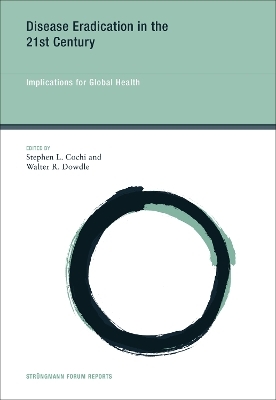
Disease Eradication in the 21st Century
Implications for Global Health
Seiten
2011
MIT Press (Verlag)
978-0-262-01673-5 (ISBN)
MIT Press (Verlag)
978-0-262-01673-5 (ISBN)
- Keine Verlagsinformationen verfügbar
- Artikel merken
Experts explore the biological, social, and economic complexities of eradicating disease.
Disease eradication represents the ultimate in global equity and the definitive outcome of good public health practice. Thirty years ago, the elimination of smallpox defined disease eradication as a monumental global achievement with lasting benefits for society. Today, the global commitment to eradicate polio and guinea worm and heightened interest in the potential eradication of other infectious diseases, including measles/rubella, lymphatic filariasis, onchocerciasis, and malaria, dominate public health concerns. But what does it take to eradicate a disease? This book takes a fresh look at the evolving concepts of disease eradication, influenced by scientific advances, field experience, societal issues, and economic realities. A diverse group of experts from around the world, representing a range of disciplines, examines the biological, social, political, and economic complexities of eradicating a disease.
The book details lessons learned from the initiatives against polio, measles/rubella, and onchocerciasis. Further chapters examine ethical issues, the investment case, governance models, organizational and institutional arrangements, political and social factors, feasibility of eradication goals, priority setting, and the integration of disease eradication programs with existing health systems.
Contributors
Stephen L. Cochi, Walter R. Dowdle, Claudia I. Emerson, Kimberly M. Thompson, Radboud J. Duintjer Tebbens, Regina Rabinovich, Lesong Conteh, B. Fenton Hall, Peter A. Singer, Maya Vijayaraghavan, Damian G. Walker, Kari Stoever, Julie Jacobson, Andy Wright, Chris Maher, Bruce Aylward, Ali Jaffer Mohamed, T. Jacob John, Robert S. Scott, Robert Hall, Jeffrey Bates, Sherine Guirguis, Thomas Moran, Peter Strebel, Eric A. Ottesen, Ciro de Quadros, Linda Muller, Jai Prakash Narain, Ole Wichmann, Alan R. Hinman, Stewart Tyson, Robin Biellik, Piya Hanvoravongchai, Sandra Mounier-Jack, Valeria Oliveira Cruz, Dina Balabanova, Yayehyirad Kitaw, Tracey Koehlmoos, Sebastiao Loureiro, Mitike Molla, Ha Trong Nguyen, Pierre Ongolo-Zogo, Umeda Sadykova, Harbandhu Sarma, Maria Gloria Teixeira M, Jasim Uddin, Alya Dabbagh, Ulla Kou Griffiths, Muhammad Ali Pate, John O. Gyapong, Adrian Hopkins, Dairiku Hozumi, Mwelecele Malecela
Disease eradication represents the ultimate in global equity and the definitive outcome of good public health practice. Thirty years ago, the elimination of smallpox defined disease eradication as a monumental global achievement with lasting benefits for society. Today, the global commitment to eradicate polio and guinea worm and heightened interest in the potential eradication of other infectious diseases, including measles/rubella, lymphatic filariasis, onchocerciasis, and malaria, dominate public health concerns. But what does it take to eradicate a disease? This book takes a fresh look at the evolving concepts of disease eradication, influenced by scientific advances, field experience, societal issues, and economic realities. A diverse group of experts from around the world, representing a range of disciplines, examines the biological, social, political, and economic complexities of eradicating a disease.
The book details lessons learned from the initiatives against polio, measles/rubella, and onchocerciasis. Further chapters examine ethical issues, the investment case, governance models, organizational and institutional arrangements, political and social factors, feasibility of eradication goals, priority setting, and the integration of disease eradication programs with existing health systems.
Contributors
Stephen L. Cochi, Walter R. Dowdle, Claudia I. Emerson, Kimberly M. Thompson, Radboud J. Duintjer Tebbens, Regina Rabinovich, Lesong Conteh, B. Fenton Hall, Peter A. Singer, Maya Vijayaraghavan, Damian G. Walker, Kari Stoever, Julie Jacobson, Andy Wright, Chris Maher, Bruce Aylward, Ali Jaffer Mohamed, T. Jacob John, Robert S. Scott, Robert Hall, Jeffrey Bates, Sherine Guirguis, Thomas Moran, Peter Strebel, Eric A. Ottesen, Ciro de Quadros, Linda Muller, Jai Prakash Narain, Ole Wichmann, Alan R. Hinman, Stewart Tyson, Robin Biellik, Piya Hanvoravongchai, Sandra Mounier-Jack, Valeria Oliveira Cruz, Dina Balabanova, Yayehyirad Kitaw, Tracey Koehlmoos, Sebastiao Loureiro, Mitike Molla, Ha Trong Nguyen, Pierre Ongolo-Zogo, Umeda Sadykova, Harbandhu Sarma, Maria Gloria Teixeira M, Jasim Uddin, Alya Dabbagh, Ulla Kou Griffiths, Muhammad Ali Pate, John O. Gyapong, Adrian Hopkins, Dairiku Hozumi, Mwelecele Malecela
Stephen L. Cochi is Senior Advisor to the Director, Global Immunization Division, at the Centers for Disease Control and Prevention. Walter R. Dowdle is Director of the Polio Antivirals Initiative at the Task Force for Global Health in Decatur, Georgia. Walter R. Dowdle is Director of the Polio Antivirals Initiative at the Task Force for Global Health in Decatur, Georgia.
| Reihe/Serie | Strüngmann Forum Reports |
|---|---|
| Zusatzinfo | 25 figures; 25 Illustrations |
| Verlagsort | Cambridge, Mass. |
| Sprache | englisch |
| Maße | 152 x 229 mm |
| Gewicht | 771 g |
| Themenwelt | Medizin / Pharmazie ► Medizinische Fachgebiete |
| Studium ► Querschnittsbereiche ► Prävention / Gesundheitsförderung | |
| Sozialwissenschaften ► Soziologie | |
| ISBN-10 | 0-262-01673-7 / 0262016737 |
| ISBN-13 | 978-0-262-01673-5 / 9780262016735 |
| Zustand | Neuware |
| Haben Sie eine Frage zum Produkt? |
Mehr entdecken
aus dem Bereich
aus dem Bereich
das Manual zur psychologischen Gesundheitsförderung
Buch | Hardcover (2023)
Springer Berlin (Verlag)
39,99 €
Orthomolekulare Medizin in Prävention, Diagnostik und Therapie
Buch | Hardcover (2022)
Thieme (Verlag)
71,00 €


